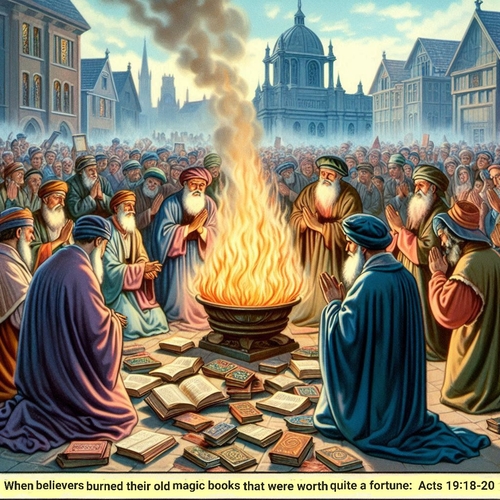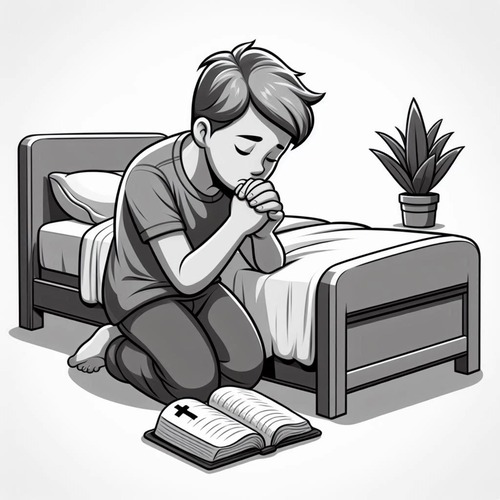Uncompromising: Why God Commands Death for Witchcraft
*When God speaks about witchcraft and sorcery in Scripture, He doesn’t mince words. In fact, He commands the death penalty: “You shall not permit a sorceress to live” (Exodus 22:18). Under the Mosaic Law, witchcraft was a capital offense—punishable by the same sentence as murder and adultery.
The Hebrew term to’evah (abomination) appears repeatedly—the same word used for the most detestable sins imaginable. In Deuteronomy 18:10-12, God declares anyone who practices divination, sorcery, or witchcraft is “an abomination to the Lord,” adding that “because of these abominations the Lord your God is driving out the nations before you.”
Why does the God of infinite love and mercy use such extreme language? The answer reveals something profound about both God’s holiness and the spiritual danger these practices pose to human souls.
DEATH FOR WITCHCRAFT: IT USURPS GOD’S SOVEREIGN AUTHORITY
The first reason God abhors witchcraft strikes at the heart of His deity: it’s a direct challenge to His absolute sovereignty. When practitioners seek supernatural power or knowledge through occult means, they’re essentially declaring independence from God’s authority.
Consider God’s words in Isaiah 8:19-20: “When they say to you, ‘Inquire of the mediums and the necromancers who chirp and mutter,’ should not a people inquire of their God? Should they inquire of the dead on behalf of the living? To the teaching and to the testimony! If they will not speak according to this word, it is because they have no dawn.”
God provides legitimate means for spiritual guidance—His Word, prayer, and the Holy Spirit. Witchcraft bypasses these God-ordained channels, attempting to manipulate spiritual forces that belong exclusively to divine control. Even when practitioners claim good intentions or “white magic,” they’re still operating outside God’s prescribed boundaries.
King Saul’s tragic end illustrates this principle. 1 Chronicles 10:13-14 explains his destruction: “Saul died for his breach of faith… he did not inquire of the Lord. Therefore the Lord put him to death.” Saul’s consultation with the medium at Endor wasn’t just a poor decision—it was rebellion against God’s sovereignty that cost him his kingdom. Even his life.
DEATH FOR WITCHCRAFT: IT OPENS DOORS TO DEMONIC DECEPTION
Scripture insists the spiritual realm contains only two kingdoms: God’s kingdom of light and Satan’s kingdom of darkness. There’s no neutral ground. When people attempt to access supernatural power outside of Christ, they’re unknowingly opening doors to demonic influence.
Paul warns in 1 Corinthians 10:20-21 the pagan practices involve demons, not mere superstition: “What pagans sacrifice they offer to demons and not to God. I do not want you to be participants with demons. You cannot drink the cup of the Lord and the cup of demons.”
The account in Acts 16:16-18 reveals this clearly. A slave girl with “a spirit of divination” brought her masters “much gain by fortune-telling.” This wasn’t psychological trickery—it was genuine supernatural activity powered by demonic forces. When Paul cast out the spirit, her abilities immediately ceased.
Here’s the terrifying reality: Satan disguises himself as an angel of light (2 Corinthians 11:14). Occult practices often appear harmless or even beneficial initially. Tarot readings, astrology, crystal healing, and other New Age practices may seem innocent, but they connect practitioners to the same spiritual source that Scripture identifies as utterly hostile to God and destructive to human souls.
Reformed theology emphasises fallen humanity lacks the spiritual discernment to navigate these waters safely. Total depravity means we cannot distinguish between God’s voice and demonic counterfeits without Scripture as our guide. Once these spiritual doors open, they prove remarkably difficult to close.
DEATH FOR WITCHCRAFT: IT CORRUPTS TRUE WORSHIP
At its core, witchcraft violates the First Commandment: “You shall have no other gods before me” (Exodus 20:3). It’s fundamentally idolatrous, seeking from creatures what only the Creator can provide.
This explains why God’s judgement was so severe in the Old Testament. In 2 Kings 21:6, King Manasseh’s occult practices—burning his son as an offering, practicing soothsaying and augury, and dealing with mediums—are described as doing “much evil in the sight of the Lord, provoking him to anger.”
Witchcraft represents the essence of human rebellion seen in Eden: the desire to be “like God” (Genesis 3:5). It feeds human pride rather than fostering dependence on divine grace. Practitioners seek to gain power, knowledge, or control through spiritual manipulation rather than submitting to God’s will and timing.
Paul includes sorcery among the “works of the flesh” in Galatians 5:19-21, warning that “those who do such things will not inherit the kingdom of God.” The Book of Revelation places sorcerers alongside murderers and idolaters in the lake of fire (Revelation 21:8), demonstrating that God’s attitude toward these practices hasn’t softened in the New Testament era.
WHY “CURIOSITY” ISN’T INNOCENT
Many dismiss occult experimentation as harmless curiosity, but Scripture offers no such luxury. Ephesians 5:11 commands believers to “take no part in the unfruitful works of darkness,” while 1 Thessalonians 5:22 instructs us to “abstain from every form of evil.”
There’s no “just for fun” when dealing with practices God calls abominations. The human heart is “deceitful above all things” (Jeremiah 17:9)—we’re prone to self-deception about sin’s true nature and consequences. Small compromises in spiritual matters often lead to greater bondage.
The danger isn’t just theoretical. Countless testimonies from former practitioners reveal how innocent curiosity led to spiritual oppression, mental torment, and separation from God. What begins as entertainment can become compulsion, then spiritual slavery.
HOPE, GREAT HOPE IN CHRIST’S VICTORY
Yet Scripture also offers hope. In Acts 19:18-20, new believers in Ephesus publicly burned their magic books worth 50,000 pieces of silver, demonstrating genuine repentance. Christ’s victory over spiritual darkness is complete (Colossians 2:15), offering freedom to all who turn from occult practices to embrace the Gospel.
God’s uncompromising stance against witchcraft isn’t arbitrary harshness—it’s protective love. He knows these practices destroy souls, separate people from His blessing, and invite spiritual forces bent on human destruction. His “no” to witchcraft is His “yes” to our spiritual safety and eternal wellbeing.
The choice is clear: we can seek supernatural fulfillment through rebellion against God, or we can find true spiritual power and purpose through submission to Christ. Only one path leads to life.
DEATH FOR WITCHCRAFT: RELATED FAQs
Why did God command death for witchcraft in the Old Testament but not the New Testament? The death penalty under Mosaic Law reflected the theocratic nature of ancient Israel, where civil and spiritual law were unified under God’s direct rule. The severity demonstrated how spiritually contaminating these practices were to God’s covenant people. In the New Testament era, the church operates under different principles—focusing on spiritual discipline, repentance, and restoration rather than civil penalties. However, the spiritual danger remains unchanged: Paul warns sorcerers “will not inherit the kingdom of God” (Galatians 5:21), indicating eternal rather than temporal judgement.
- What happens to people who start with “harmless” curiosity about the occult? Countless testimonies reveal a consistent pattern: what begins as innocent experimentation often leads to spiritual bondage. Former practitioners describe how casual involvement with tarot cards, Ouija boards, or astrology gradually became compulsive, then oppressive. Many report experiencing unexplained fear, nightmares, depression, and a sense of being watched or controlled. The demonic realm operates through deception—appearing attractive initially but tightening its grip over time. This matches Scripture’s warning that Satan disguises himself as an “angel of light” (2 Corinthians 11:14).
- Are there different levels of occult involvement, or is it all equally dangerous? Scripture makes no distinction between “white” and “black” magic, or major versus minor occult practices. God’s prohibition in Deuteronomy 18:10-11 covers the full spectrum: divination, fortune-telling, sorcery, spells, mediums, necromancy—all are called “abominations.” From the Bible’s perspective, any attempt to access supernatural power outside God’s prescribed means opens the same spiritual door. Even seemingly innocent practices like reading horoscopes or using crystals connect to the same demonic source that powers more obviously sinister activities.
Why does God call witchcraft an “abomination” when He shows mercy to other sinners? The term “abomination” (to’evah) indicates something that corrupts God’s created order at its foundation. Witchcraft doesn’t just break God’s law—it actively invites His enemies (demons) to establish strongholds in human lives. It’s rebellion that compounds itself by opening doors for further spiritual contamination. However, God’s mercy remains available: Acts 19:18-20 shows former sorcerers in Ephesus finding freedom through repentance and faith in Christ, publicly burning their magic books worth a fortune.
- What does the Greek word pharmakeia reveal about New Testament attitudes toward sorcery? The Greek term pharmakeia (used in Galatians 5:20 and Revelation 18:23) literally means “the use of drugs” but specifically refers to drug use connected to occult practices and spell-casting. In ancient Greek culture, sorcerers commonly used mind-altering substances to induce trances, contact spirits, and perform magical rituals. The word appears in Paul’s list of “works of the flesh” alongside murder and idolatry, showing the New Testament writers viewed drug-enhanced sorcery as equally serious. The connection between pharmaceuticals and spiritual deception remains relevant today, as many report occult experiences during drug use that open doors to demonic influence.
- How can we tell if we’ve been affected by occult involvement? Common signs include persistent fear, nightmares, unexplained depression, compulsive thoughts about occult practices, difficulty praying or reading Scripture, and sensing an oppressive spiritual presence—especially when alone in a room. Many report feeling spiritually “blocked” from God or experiencing unusual physical manifestations during prayer. Former practitioners often describe a sense of being watched or controlled, along with increased interest in darker spiritual themes. These symptoms may persist even after stopping occult activities, requiring genuine repentance, renunciation of past involvement, and often pastoral counselling for complete freedom.
Can we be fully delivered from occult bondage, or are we permanently damaged? Scripture offers complete hope for deliverance through Christ’s victory over the demonic powers (Colossians 2:15). The Ephesian believers who burned their magic books experienced total transformation (Acts 19:18-20), and countless modern testimonies confirm God’s power to break occult bondage entirely. Freedom typically requires genuine repentance, public renunciation of past involvement, destruction of occult objects, and ongoing discipleship in sound biblical teaching. Some may need pastoral counselling to address lingering effects, but Christ’s blood is sufficient to cleanse from all sin—including occult involvement.
DEATH FOR WITCHCRAFT: OUR RELATED POSTS
Editor's Pick

Do Christians Need Holy Shrines? Why the Reformed Answer Is No
Walk into a medieval cathedral and you'll encounter ornate shrines, gilded reliquaries, and designated "holy places" where pilgrims gather to [...]

I Want To Believe, But Can’t: What Do I Do?
"I want to believe in God. I really do. But I just can't seem to make it happen. I've tried [...]

BC 1446 or 1250: When Did the Exodus Really Happen?
WHY REFORMED SCHOLARS SUPPORT THE EARLY DATE Many a critic makes the claim: “Archaeology has disproven the biblical account [...]

Does God Know the Future? All of It, Perfectly?
Think about this: our prayers tell on us. Every time we ask God for something, we’re confessing—often without realising it—what [...]

Can Christian Couples Choose Permanent Birth Control?
Consider Sarah, whose fourth pregnancy nearly killed her due to severe pre-eclampsia, leaving her hospitalised for months. Or David and [...]

Bone of My Bones: Why Eve Was Created From Adam’s Body
"This at last is bone of my bones and flesh of my flesh!" Adam's joyful exclamation upon first seeing Eve [...]

Is Calvinism Fatalism in Christian Disguise? Think Again
We hear the taunt every now and then: "Calvinism is just fatalism dressed up in Christian jargon." Critics argue Reformed [...]

Can Churches Conduct Same-Sex Weddings?
In an era of rapid cultural change, churches across America face mounting pressure to redefine their understanding of marriage. As [...]

Gender Reassignment: Can Christian Doctors Perform These Surgeries?
In the quiet of a clinic, a Christian physician faces a challenging ethical question. A patient sits across the desk, [...]

‘What Sorrow Awaits You Who Are Rich…’: What Does Jesus Mean?
The words hang in the air like a sword over comfortable Christianity: “What sorrow awaits you who are rich, for [...]
SUPPORT US:
Feel the Holy Spirit's gentle nudge to partner with us?
Donate Online:
Account Name: TRUTHS TO DIE FOR FOUNDATION
Account Number: 10243565459
Bank IFSC: IDFB0043391
Bank Name: IDFC FIRST BANK






